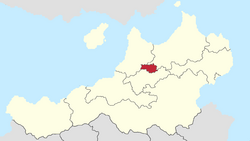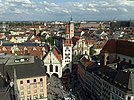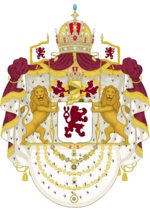Westbrücken
Westbrücken | |
|---|---|
Capital city, state and municipality | |
|
From top: Westbrücken Cathedral; Leopoldplatz; Meyer Gardens; Bundestag building; the Fürstenweg financial district; TMG headquarters; Victory Gate; Invictus Park | |
 | |
| Country | Werania |
| State | Westbrücken |
| Government | |
| • Body | Gemeinderat |
| • Lord mayor | Ursula Böhmer (Greens) |
| Population | |
| • Urban | 1,075,896 |
| • Metro | 2,467,225 |
| Demonyms | Westbrückener(s) (English) Westbrückener (m), Westbrückenerin (f) (German) |
| Area code | 057 |
| ISO 3166 code | OS-WB |
| Vehicle registration | W |
| GRP (nominal) | €69 billion (2020) |
| GRP per capita | €64,602 (2020) |
| GeoTLD | .westbrücken |
Westbrücken officially the Free City of Westbrücken (Weranian: Freie Stadt Westbrücken) is the capital city of Werania, being its second largest city after Wiesstadt. It is one of Werania's 12 states and borders Elbenweis, Bonnlitz-Ostbrücken and continental Roetenberg. The cities metropolitan area includes almost 2.5 million people.
Lying on the bank of the Bach river Westbrücken has a temperate climate. Around a quarter of Westbrücken is made up of forests, parks, gardens, rivers, canals and lakes particularly around the west of the city. Westbrücken lies in the Cislanian dialect-language region being the second largest city in that region again after Wiesstadt.
The city was first mentioned by the Estmerish in their wars with the Rudolphine Confederation during the 1000's. It was one of the most important cities in the confederation as the seat of several institutions including the imperial diet. In 1640 Westbrücken was designated the capital of the confederation, although this was only nominal as the royal court was based in Wiesstadt. Starting with the Weranian revolution Westbrücken was the site of political radicalism and Weranian nationalist efforts, culminating with it becoming the capital of Werania following unification in 1842. During the Great War Westbrücken was bombed by Entente forces but largely rebuilt in a classical style following the war. In 1982 Westbrücken hosted the Invictus Games.
Westbrücken is a global city being a centre of art, science, technology, finance, publishing, culture, innovation, education, business, and tourism. Historically Westbrücken was notable as an intellectual and cultural hub for music and philosophy being nicknamed the "City of Thinkers" and has been the centre of Weranian avant-garde movements since the 1890s. Westbrücken is known for its festivals, historical monuments and nightlife. As of 2020 one third of the city's inhabitants are of foreign descent.
Possessing the highest standard of living in Werania Westbrücken's service-driven economy is notable for its IT and high tech industries, automobiles and creative industries. The city however has recently grappled with a much higher cost of living and housing shortages.










